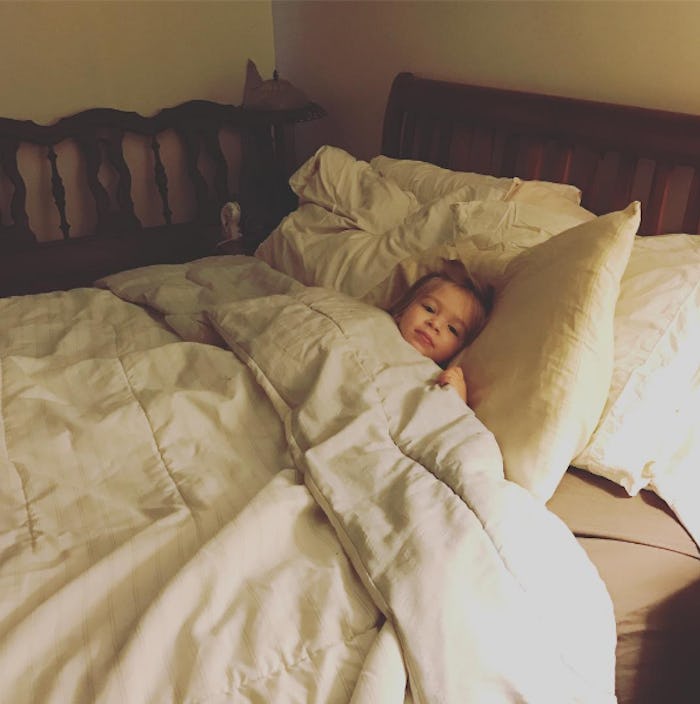It's universally known that babies aren't the best sleepers. They wake up at all hours of the night and aren't exactly happy with you saying, "Just one more story" in an effort to get them to bed. But toddlers? You kind of hope toddlers figure out the sleeping thing better than babies. After all, they can pick out bedtime stories, their pajamas, and they know what bedtime means. But that doesn't mean they're great sleepers, either. So before you lose your mind, find out everything you need to know about sleep training a toddler so you can finally get some rest.
Toddlers are known for their strong wills and ability to fight anything (like a banana that's not the exact shade of yellow they prefer), but it is possible to get your child to sleep. When you're sleep training, the important thing to remember is that you're consistent. "If you want to make a change (and sleep training is a change), often there is an 'extinction burst,'" Dr. Craig Canapari, director of the Yale Pediatric Sleep Center, tells Romper. "What this means is that the behavior you are trying to get rid of gets worse. Sop arents may try to sleep train for a few days, then give up when their child’s sleep gets a little bit worse — they give up after two nights, when things would get better in three or four."
It can be tough to fight this, especially with a toddler. But as The Baby Sleep Site pointed out, sleep training a toddler is just as much about discipline and boundaries as it is about healthy sleep habits. Canapari says that any inconsistency you may be facing with sleep training tends to reinforce the undesirable behavior. Canapari explains:
If your child demands that you lie down with him every night until he falls asleep, if you give in occasionally, this sends a signal called "intermittent positive reinforcement." Research into behavior has shown that this is a very powerful cue to continue his demands — more powerful than if you gave in every night. This is analogous to the powerfully addictive effect of slot machines. People pull the lever over and over because they don’t know when they will win.
So first thing you need to know? Be patient and be consistent. And then figure out what's causing your toddler's sleep issues. Are they hungry? Are they napping too long during the day? Is there not a bedtime routine for them to follow? The Baby Sleep Site recommended offering snacks before bedtime as well as giving a very clear end to the bedtime routine. Kiddos are all about stalling bedtime, so if they know that they can read as many books as they want, they'll keep the library open. (Trust me, I had to cap my own toddler at two books.)
But it's also important to recognize that tantrums may happen. As Canapari pointed out, things could get worse before they could get better. Your little one may throw massive fit after fit at bedtime before they finally start going down without an issue. If your kid seems reluctant to be in their room or their bed, Canapari noted on his own website that it helps to create a positive space in the room. Let your children play in there during the day and spend more time in their room so they don't feel such an aversion to it.
Sleep training a toddler is hard, but it's all about dissolving any sleep associations (no sitting on their bed until they fall asleep) and teaching them that they can sleep on their own. Parenting suggested rewards, like a sticker chart to show your toddler how well they've been sleeping, and it's a great way to create positive energy around sleep training. Like potty training, your kids need encouragement, especially when you're making a big change, and it works. The Baby Sleep Site also recommended bigger incentives, like after a week of sleeping well, they get to pick out a small toy at the store.
If you think it's more than just a battle of wills keeping your child from sleeping, reach out to your toddler's pediatrician for help. There could be an underlying factor you aren't wary of that's keeping them from sleeping. (Or you could literally have the most stubborn child in the world.)
